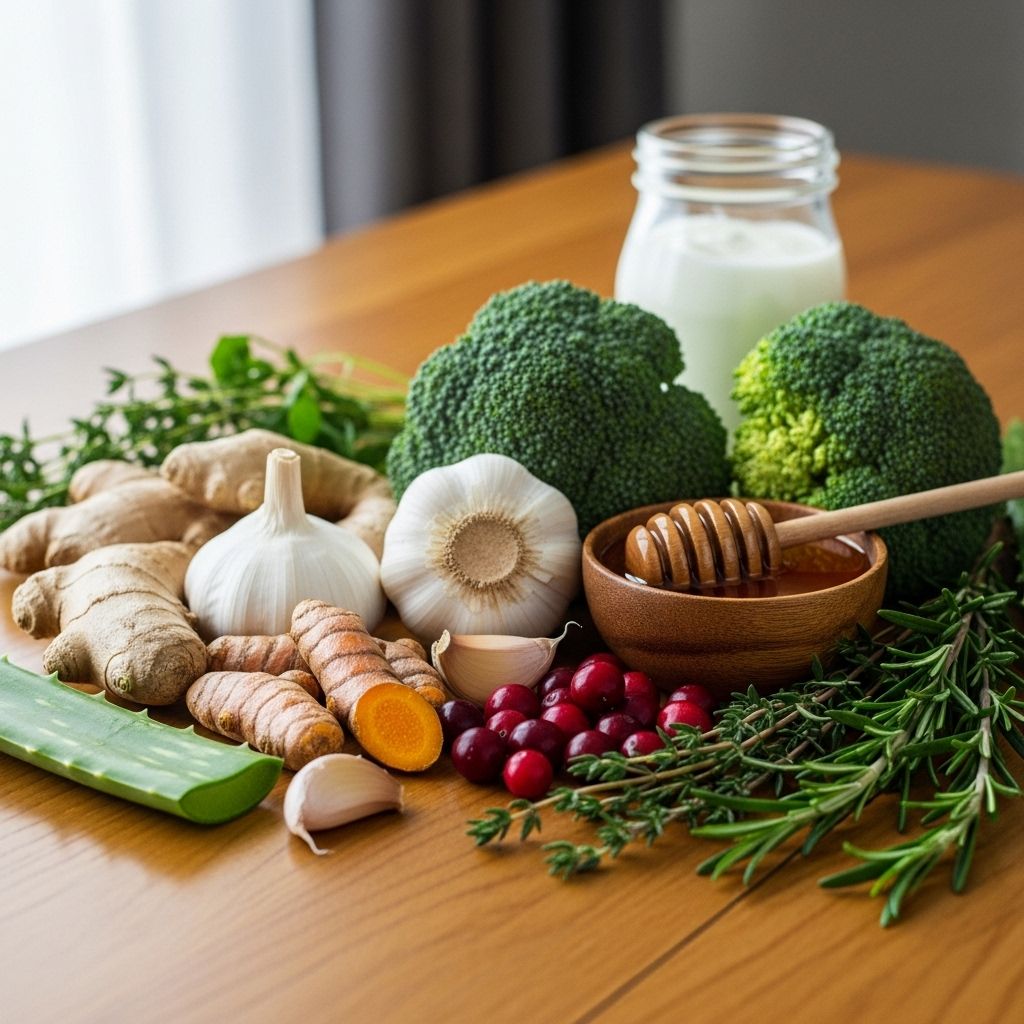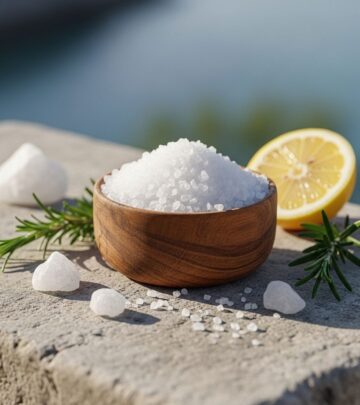Helicobacter Pylori: Natural Treatments, Remedies, and Dietary Advice
Holistic food and habits can complement treatment to relieve inflammation and improve digestion.

Helicobacter pylori, more commonly known as H. pylori, is a type of bacteria that infects the lining of the stomach. It affects millions worldwide and is a leading cause of gastric issues such as ulcers, gastritis, and, in severe cases, stomach cancer. Standard medical treatment often involves a combination of antibiotics with proton pump inhibitors (known as triple therapy), but increasing issues with antibiotic resistance and side effects have made many seek out natural remedies to complement or support standard care.
Understanding Helicobacter Pylori Infection
H. pylori is spiral-shaped bacteria that thrive in the acidic environment of the stomach. This infection is typically acquired during childhood, often through food or water contamination or close contact with an infected individual. While more than half of the world’s population harbors H. pylori, only a fraction experiences symptoms or complications such as peptic or duodenal ulcers, chronic gastritis, bloating, and, in rare cases, gastric cancer.
Symptoms of H. pylori Infection
- Abdominal pain or burning sensation
- Bloating and belching
- Nausea and loss of appetite
- Frequent burping
- Unexplained weight loss
- Fatigue
- Dark or tarry stools (if ulcers bleed)
Mainstream Treatment Versus Natural Remedies
Conventional therapy uses antibiotics and proton pump inhibitors (PPIs) to eradicate the bacteria, but:
- It may lead to antibiotic resistance, causing treatment failure.
- Common side effects include nausea, diarrhea, gastrointestinal upset, and altered gut microflora.
This has driven interest in natural alternatives and adjunct therapies, particularly ones focused on restoring gut health and reducing bacterial load without encouraging further resistance or side effects.
Natural Remedies and Evidence-Based Alternatives for H. pylori
Several natural substances have shown antimicrobial or soothing effects on H. pylori, either by inhibiting bacterial growth, promoting gut health, or reducing inflammation. Many are best used as supportive therapies rather than outright replacements for conventional approaches, especially for symptomatic or advanced cases. Always consult a healthcare provider before starting any new remedy.
1. Probiotics
Probiotics are beneficial bacteria that can support healthy gut flora and outcompete harmful bacteria like H. pylori.
- Multiple studies suggest strains such as Lactobacillus fermentum, Lactobacillus casei, and Lactobacillus brevis can lower H. pylori counts and improve eradication rates when combined with prescription antibiotics.
- They may also reduce the side effects of antibiotics and help restore gut balance.
- Sources: Yogurt, kefir, sauerkraut, kimchi, and probiotic supplements.
2. Green Tea
Green tea contains catechins, potent plant antioxidants shown in multiple studies to have antibacterial effects against H. pylori.
- Animal and human trials reveal that green tea may reduce the growth of H. pylori bacteria and decrease ulcer formation.
- Drinking green tea regularly could potentially help prevent infection or slow its progression.
3. Honey (Especially Manuka Honey)
Honey, particularly raw or Manuka honey, possesses natural antibacterial and healing properties.
- Some lab studies find that honey can inhibit H. pylori growth and may enhance ulcer healing.
- While honey is unlikely to eradicate infection on its own, it can be beneficial as a supplement, particularly in tea or as a natural sweetener.
4. Olive Oil
Olive oil is rich in polyphenols which have demonstrated antibacterial effects in test-tube studies.
- Small studies suggest olive oil may help reduce H. pylori activity and protect against stomach lining damage.
- It’s also a heart-healthy fat for daily dietary use.
5. Licorice Root
Licorice root (often in the form of deglycyrrhizinated licorice, or DGL) is another herbal remedy studied for H. pylori.
- Research indicates licorice root may prevent H. pylori from adhering to stomach walls, increase eradication rates, and support ulcer healing.
- DGL (a safer form) can be taken as tablets or tea.
- Consult your healthcare provider before using, especially if you have high blood pressure or take heart medications.
6. Broccoli Sprouts
Broccoli sprouts are high in sulforaphane, a compound noted for its antimicrobial and anti-inflammatory actions.
- Sulforaphane-rich foods can suppress H. pylori, reduce inflammation, and may help heal the gastric mucosa.
- Try adding fresh sprouts to salads, smoothies, or sandwiches.
7. Black Seed (Nigella Sativa)
Black seed oil contains thymoquinone, which may help reduce H. pylori load and ease indigestion symptoms.
- Small trials suggest black seed can be as effective as conventional triple therapy when combined with other remedies.
8. Garlic
Garlic is traditionally lauded for its potent antimicrobial compounds.
- Consuming fresh garlic may help reduce the presence of H. pylori in the stomach and support overall immune health.
- Can be eaten raw, cooked, or as a supplement (check with your physician for best results).
9. Propolis
Propolis is a resin collected by bees, rich in phenolic compounds with substantial antibacterial action.
- Research finds propolis extract may inhibit H. pylori and promote healing of stomach tissue.
- Available in capsules or tinctures, usually found in health food stores.
10. Phototherapy & Curcumin
Phototherapy (light-based treatments) and curcumin (from turmeric) are promising alternatives, though research is still emerging. Both may possess antibacterial and anti-inflammatory properties, but more human studies are needed.
11. Aloe Vera
Aloe vera juice is sometimes recommended for soothing the digestive tract and reducing inflammation, but clinical evidence is limited.
Dietary Guidelines: What to Eat and Avoid with H. pylori
Proper nutrition can ease symptoms, boost your immune system, and complement natural or medical therapies. Dietary interventions alone are unlikely to cure H. pylori, but they play a vital supportive role in gut health and recovery.
Recommended Foods
- Probiotic-rich foods: yogurt, kefir, sauerkraut, kimchi
- High-fiber foods: whole grains, legumes, fruits, and vegetables
- Cruciferous vegetables: broccoli, Brussels sprouts, cabbage
- Omega-3 rich foods: wild-caught fish (salmon, sardines), flax and chia seeds
- Berries: blueberries, raspberries, strawberries (contain polyphenols)
- Anti-inflammatory herbs: ginger, turmeric, sage, meadowsweet
Foods to Limit or Avoid
- Caffeine (coffee, strong tea)
- Carbonated drinks
- Processed, fatty, or spicy foods
- Pickled or highly salted foods
- Low-fiber, refined grains
Lifestyle Measures for Better H. pylori Outcomes
Non-dietary factors have a substantial impact on symptom severity and healing. Effective stress management and gut-friendly habits support immune defense and may help prevent recurrence.
Key Lifestyle Tips
- Manage stress: Practice relaxation techniques such as yoga, deep breathing, tai chi, and meditation.
- Quit smoking: Tobacco use increases the risk of ulcers and impedes healing.
- Limit alcohol: Alcohol irritates the stomach lining and can worsen symptoms.
- Practice proper hygiene: Wash hands before eating and after using the bathroom to minimize reinfection or spread.
Risks, Precautions, and When to See a Doctor
Though natural therapies can be helpful adjuncts, H. pylori infection can lead to serious health issues when left untreated. Always contact a healthcare professional if you:
- Experience severe or persistent abdominal pain
- Notice blood in your stool or vomit
- Have unexplained weight loss or fatigue
- Fail to improve with home remedies
Consult your doctor before starting new supplements, especially if you’re pregnant, breastfeeding, or have chronic health conditions. Some natural remedies (e.g., licorice root, propolis) may interact with medications or underlying disorders.
Prevention Strategies for H. pylori Infection
- Consume filtered or boiled water in regions where contamination is likely.
- Cook food thoroughly and wash produce well.
- Avoid sharing eating utensils and food with individuals who may be infected.
- Maintain good household and personal hygiene.
Frequently Asked Questions (FAQs)
Q: Can I treat H. pylori naturally without antibiotics?
A: Natural therapies may help reduce bacterial load and offer symptom relief, but antibiotics remain the most reliable approach to eradicating H. pylori. In mild cases or for prevention, certain remedies may be supportive but should not replace prescribed treatment.
Q: Can specific foods kill H. pylori?
A: Some foods (e.g., broccoli sprouts, green tea, honey, garlic) have demonstrated anti-H. pylori activity in laboratory or animal studies. However, there is no current evidence to show that food alone can completely eradicate the bacteria.
Q: Is it safe to use herbal supplements for H. pylori?
A: Some herbal therapies (like licorice root and propolis) are generally regarded as safe, but they can interact with prescription medications or pre-existing health issues. Always consult a healthcare provider before starting herbal remedies.
Q: Will diet changes alone cure my H. pylori?
A: Dietary adjustments can support gut health, reduce symptoms, and aid healing. However, diet alone is rarely enough to eradicate H. pylori, especially in symptomatic or persistent infections.
Q: Can H. pylori recur after treatment?
A: Yes, recurrence can occur if the bacteria aren’t fully eradicated or if reinfection takes place. Good hygiene and completing your prescribed therapy are vital preventative steps.
Summary Table: Natural Remedies for H. pylori
| Remedy | Main Benefit | Evidence Level | Notes |
|---|---|---|---|
| Probiotics | Restores healthy gut flora, may reduce symptoms | High | Often works best with antibiotics |
| Green Tea | Antioxidant, may inhibit H. pylori | Moderate | Regular consumption is most effective |
| Honey (Manuka/Raw) | Antibacterial, may heal ulcers | Moderate | Best as adjunct therapy |
| Broccoli Sprouts | Suppresses bacteria, reduces inflammation | Moderate | Rich in sulforaphane |
| Licorice Root (DGL) | Inhibits H. pylori adhesion, soothes stomach | Moderate | Avoid true licorice if hypertension present |
| Propolis | Antibacterial, supports mucosal healing | Moderate | Avoid if allergic to bee products |
| Garlic | Inhibits bacteria, supports immunity | Low to Moderate | Can be added to food or taken as supplement |
Key Takeaways
- Natural remedies can support gut healing and symptom relief in H. pylori infections, especially alongside medical treatment.
- Do not self-treat or abruptly stop medical therapy in favor of natural remedies without medical guidance.
- Diet, lifestyle, and stress management play central roles in prevention, healing, and relapse avoidance.
References
- https://www.healthline.com/health/digestive-health/h-pylori-natural-treatment
- https://draxe.com/health/h-pylori/
- https://www.medicalnewstoday.com/articles/322627
- https://pmc.ncbi.nlm.nih.gov/articles/PMC4848239/
- https://www.vinmec.com/eng/blog/what-should-eat-to-kill-hp-bacteria-in-the-stomach-en
- https://www.frontiersin.org/journals/medicine/articles/10.3389/fmed.2023.1324473/full
- https://pmc.ncbi.nlm.nih.gov/articles/PMC3925854/
- https://ucfhealth.com/our-services/lifestyle-medicine/h-pylori-diet/
- https://www.dietvsdisease.org/treat-h-pylori-naturally/
Read full bio of medha deb










